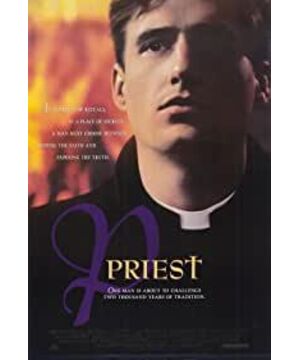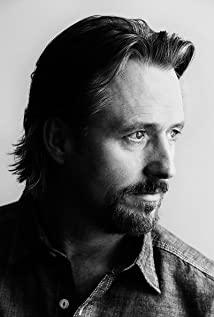I couldn't help thinking about it, what would a Protestant person think of after watching the film? What if a Catholic person thinks after reading it? I don't intend to exaggerate the differences between the two. Isn't it enough that these hundreds of years of arguing against each other are not enough? So I want to jump out of this framework, it doesn't matter here whether or not I deliberately insinuate Catholicism. As far as the film itself is concerned, the message it conveys to me, I want to talk about my own thoughts. This is just a statement from one family, and I don't want readers to form a lengthy scolding war behind my article.
From beginning to end, what the film wants to express is—Christ is love.
How to imitate Christ? Abide by dogma and law? Wouldn't it become a Pharisee? When Greg Pilkington struggled with whether to inform her mother of his father's rape of his daughter Lisa, he struggled with pain. According to the church's regulations, he can't do that, but if he doesn't do it, how can such a crime be prevented? When he saw the girl's mother knowing nothing under the inefficiency of the suggestion, he couldn't bear it anymore. When he returned to the room, he became angry at the cross and the idol, threw something, and scolded. He is like a helpless child, unable to bear the torment of his conscience. He may be at a loss for a moment, and even doubt about Jesus Christ. Why doesn't God help that child?
Was Jesus who was crucified two thousand years ago really God? Why are the disasters in human history over the past two thousand years, whether group or individual, or even innocent and kind-hearted people, have not been spared? When will such human tragedies continue to happen? Why doesn't God stop these sins and disasters?
Such questions are not only for non-Christian people, but also for Christians themselves. I think that in a person's religious experience, he will almost always encounter this situation. And when we ourselves face disasters and suffer misfortunes, we also become suspicious. Perhaps, when we value ourselves too much, it is indeed difficult to understand this dilemma. However, without these unfortunate encounters, would we meet God? Pain is the place where God is manifested. I am not saying that God gave mankind some natural disasters in order to enlighten us, or let individuals suffer misfortune. The fall of man has destroyed the relationship between man and God, and the world has lost harmony since the beginning of the fall of man. If we just perish in pain, it is impossible to get any enlightenment. Unless we open ourselves to God, we can be saved. God has given us the meaning of suffering in this world, and without Him, suffering is meaningless. When Jesus, the most innocent man in the world, was nailed to the cross, the cross had meaning-the tree of life. If we do not see the meaning of pain, we can only waste this life in meaninglessness. We cannot find eternal life.
Greg Pilkington was angry at the cross, crying and praying, but God had already responded to him. The girl's mother climbed to the second floor under the sound of the siren, only to discover the crime of father and daughter incest. The next day his mother rushed into the church and scolded the priest: "You knew it, right? Why didn't you say? You are still not a human?" Greg Pilkington was helpless, but he felt fortunate that the girl was rescued. It's just that the price is too high, for the mother, the girl, and Greg Pilkington himself. Greg Pilkington was burdened by what he shouldn't have, and I think it was out of love that he silently took it.
Unfortunately, Greg Pilkington's gay identity was revealed shortly afterwards. The believers in the parish spurned him and wanted to drive him away. People no longer accept this gay priest, as if he was dirty from top to bottom. I once thought that this was a movie made from a gay standpoint. I didn't realize until the end of the drama that homosexuality is not the theme of the whole film. When Greg Pilkington returned to the parish under the persuasion of Father Matthew Thomas to continue the mass, people protested loudly and left the meeting in indignation. Those who stayed no longer lined up to go to Greg Pilkington to receive the Eucharist. Everyone's spit, rustling remarks, contemptuous glances, and disdainful expressions cut Greg Pilkington like knives. Who can pity him? Who would forgive him?
Lisa squeezed from the crowd and walked straight to Greg Pilkington.
-"This is the body of Christ."
-"Amen."
Greg Pilkington hugged Lisa sadly and cried. He was on the verge of collapse and finally gained acceptance and love, even if he was alone.
Christ is love. what is love? It is unconditional forgiveness and acceptance.
I once heard of two Christian women chatting, and they said that they could forgive murderers, how tall and majestic their words are. When it comes to my friend's being a junior, I can't forgive it because of contempt and disgust. They may not realize their contradictions. As I have observed, some Christians regard faith as morality. It seems that if you have faith, you will be superior to others and will naturally occupy the high ground morally.
Christians are also human beings, who have their own weaknesses and sins. But can a Christian bear his own weakness and sin and follow Christ? If Christians cannot recognize Christ, how can they imitate and follow? It is true that observing the precepts is very important, but can the creed of love be explained and marked by the rules and regulations of the law?
Letter, the word is too heavy. That's because we value ourselves so much that we can't bear our weaknesses and sins, and we can't deliver ourselves. Speaking of which, Christians are praising God every day, they can manage themselves well, and they are also eager to help others...but it is difficult for us to accept others completely, let alone accept a person who has committed crimes. Occasionally someone offends himself, don't you think about it? Or do you never forget your hatred? Can we forgive our enemies? I have seriously thought that I can't do this at all by myself, and I must always remind myself to be patient, humble, and overcome my arrogance.
It seems that God's goal is too difficult, only Jesus can do it perfectly. I don't know how far I can reach. My ideal Christian is a person who is constantly stumbled by his own weaknesses and climbs up and walks towards God with difficulty until the end of his life.
View more about Priest reviews











